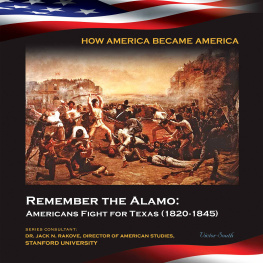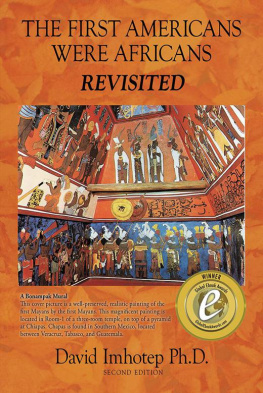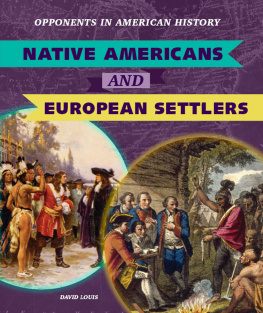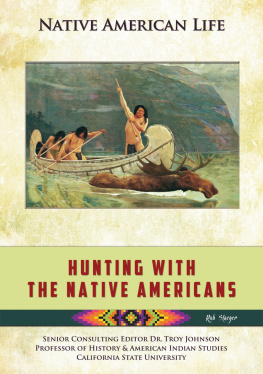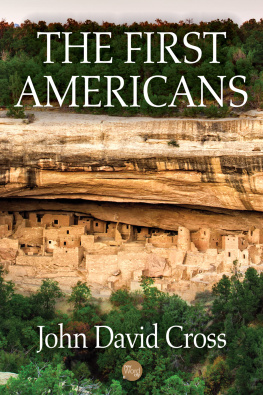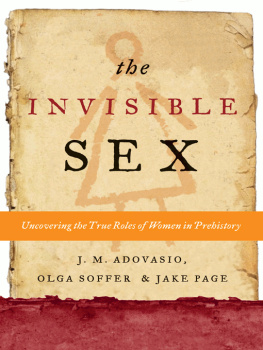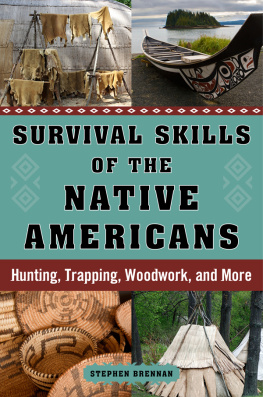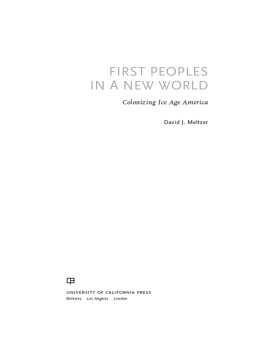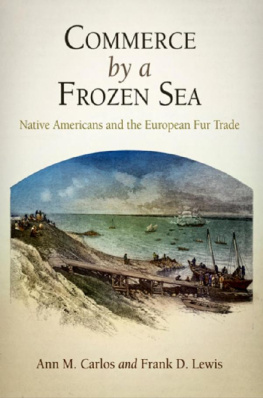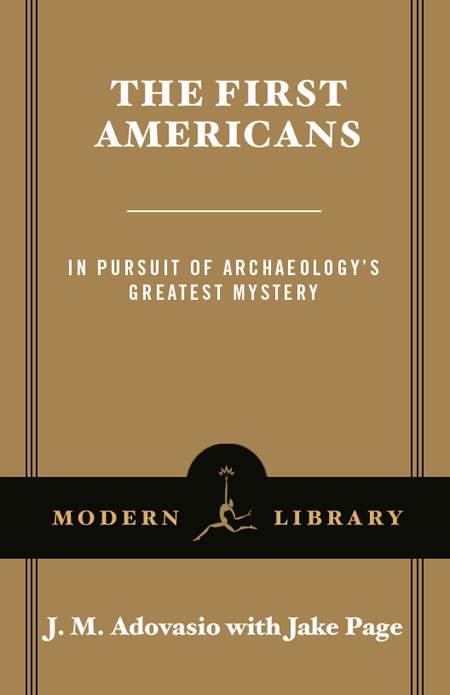Praise for The First Americans
Throughout, Adovasio's pull-no-punches approach peppers the narrative with vigor. In this lively telling, the journey to learn all the things we don't know has seldom been more fascinatingly rendered.
Los Angeles Times
In the summer of 1973, University of Pittsburgh archaeologist James Adovasio began to excavate a nearby rock shelter. By the next summer, he had dug a hole ten feet deep exposing at least twenty separate layers of human occupation that included identifiable artifacts. He later encountered layers with decidedly human artifacts that were unknown to scholars. [T]he radiocarbon dates were about 13,000 years old, 1,500 years before the earliest accepted date for the peopling of the Americas. Eventually, Adovasio would get even older dates16,000 years agofrom the Meadowcroft Rock Shelter. The First Americans tells the story of one of the most exciting and controversial research projects in the history of American archaeology.
American Archaeology
In recent years many books have been written about the archaeology of the first Americans, but if there is an untold story, this is it. Adovasio's (and Page's) scholarly perspective is expert and sophisticated; Adovasio's arguments are boldly presented in clear, elegant prose.
T OM D. D ILLEHAY , author of The Settlement of the Americas: A New Prehistory
The First Americans is a lively look at a contentious debate by a man in the middle of it.
Science News
James Adovasio is the perfect guide to the science, the infighting, and the passion surrounding a deceptively simple question: When was the Western Hemisphere first peopled? Read to find where the bodies are buried. Read for enjoyment. But above all, read for honest answers.
C LIVE G AMBLE , Centre for the Archaeology of Human Origins, University of Southampton
Adovasio proved well-suited for the combat his work thrust upon him. [H]e was taught the strictest standards of meticulous field research by legendary archaeologist Jesse D. Jennings at the University of Utah. As a result, his work at Meadowcroft is above technical criticism. Adovasio offers a lengthy, lucid natural history of North Americaglaciation, megafauna, extinction theories, climate changesthat is sheer pleasure to read. He also shows how politics, religion, racism and other preconceptions have hindered scientific observation of American Indians since the time of Columbus. And he presents frequent, dismissive criticisms of the way science is taught and done. All in all, The First Americans is about as good as popular science writing gets.
Sun-Sentinel (Fort Lauderdale)
This book offers us a frank exploration of the often nasty debates that swirl around the earliest archaeological sites that the Americas have to offer and the archaeologists who study them. A book like this could be written only by a bold insidersomeone who has long worked in the area, has participated in all the debates, knows all the players, and is fearless. Adovasio is all these things.
D ONALD K. G RAYSON , professor of anthropology, University of Washington
In all, readers get a lively, close-up view of how archaeologists study America's original discoverers.
Booklist
This is a story only Jim Adovasio could tellhe is simultaneously the most meticulous fieldworker and entertaining storyteller I have met in my thirty-five years as an archaeologist. It is archaeology from the inside.
D AVE M ADSEN , senior scientist, Environmental Science Program, Utah Geological Survey
The professor's discovery not only shook the very foundations of modern archaeology, it set Adovasio himself on a mission to uncover one of the greatest mysteries of all time: uncovering the origins of the first Americans and explaining how they got here. [The First Americans] is well written and thoroughly researched, not surprising given Adovasio's impressive credentials, which include teaching at or performing research for the Smithsonian Institution, Youngstown State University, the University of Pittsburgh, the Carnegie Institute and Mercyhurst College (Pa.). What is surprising is Adovasio'salong with coauthor Jake Page'slively prose and downright funny anecdotes. It's an enjoyable read.
The Post and Courier (Charleston, S.C.)
This book, written with Jake Page, is vintage Adovasio: incisive, funny, self-deprecating in his own imperial manner, and sure to trigger howls from the brethren at the receiving end of his barbs. But this is no hit-and-run book: it's a detailed and wide-ranging exploration of the history and current state of views on the archaeology, geology, and environment of late Pleistocene North America. It provides an important perspective on the fierce storm over the peopling of the Americas, from one who's been at its churning center for well on three decades.
D AVID J. M ELTZER , professor of anthropology, Southern Methodist University
[The First Americans] admirably lays out how new digs and new theories have further pushed back the ETA of the New World's first occupants some 30,000 years.
The Week
CONTENTS
Chapter One:
Chapter Two:
Chapter Three:
Chapter Four:
Chapter Five:
Chapter Six:
Chapter Seven:
Chapter Eight:
Chapter Ten:
Chapter Eleven:
To the late Albert and Delvin Miller, without whom there would be no Meadowcroft.
To John and the late Edward Boyle, who generously supported the work at Meadowcroft from the beginning.
And to the late R. L. Andrews, who made the Meadowcroft adventure so much better.
ACKNOWLEDGMENTS
I 've wanted to be an archaeologist since I was four or five years old. My early interest in the field was fashioned by my mother, Lena Adovasio, a quadruple major (ancient history, French, Latin, and German) at Marietta College. She provided my initial entre into history, prehistory, and pale-ontology by teaching me to read books on those subjects and by continually encouraging me in the direction to which she first steered me. My choice of careers was fostered by my sixth-grade teacher, Samuel A. Loree, who thought (and I hope still thinks) that archaeology was a worthy field of endeavor, and shortly thereafter I decided I wanted to go to the University of Arizona when I grew up.
As most will attest, I never did grow up, but I did attend the University ofArizona, where my career trajectory was molded, wittingly or otherwise, by Malcolm McFee, William A. Longacre, and especially by the example of the late Emil Haury, the prototypical gentleman and scholar. I was also influenced, at least indirectly, by C. Vance Haynes, who was already well on the road that would ultimately lead him to the National Academy of Sciences.
While I would like to think I became a passable anthropologist at Arizona, my transformation into an anthropological archaeologist would occur under the ominous shadow of The Dark Lord, Jesse D. Jennings, at the University of Utah, where I would also be profoundly influenced by C. Melvin Aikens and my colleagues Gary F. Fry, John Jack P. Marwitt, and D. Dave Brigham Madsen.
Through the intervening years, Madsen and Aikens have continued to represent the archetypes for anthropological scholars, as have David B. Meltzer and Thomas Dillehay, who appear frequently in this book andwhose opinions I have valued for a very long time. The same can be said for the sister I never had, Olga Soffer, with whom I have collaborated for more than a decade and whose insights into prehistoric behavior as well as personal support during times of great personal stress have been profound. All of the aforecited individuals as well as my longtime fellow traveler in Pennsylvania, Kurt Carr, have helped shape the prism through which I look at the past and have contributed in a very real way to the formation or refinement of some of the ideas contained in this book. A special debt of gratitude is also owed to Dave Pedler (the longtime Mercyhurst Archaeo-logical Institute editor and a close collaborator with me on many forays into Paleo-Indian commentary), who never ceases to remind me of the need to avoid convoluted Victorian prose when pontificating about the past.


